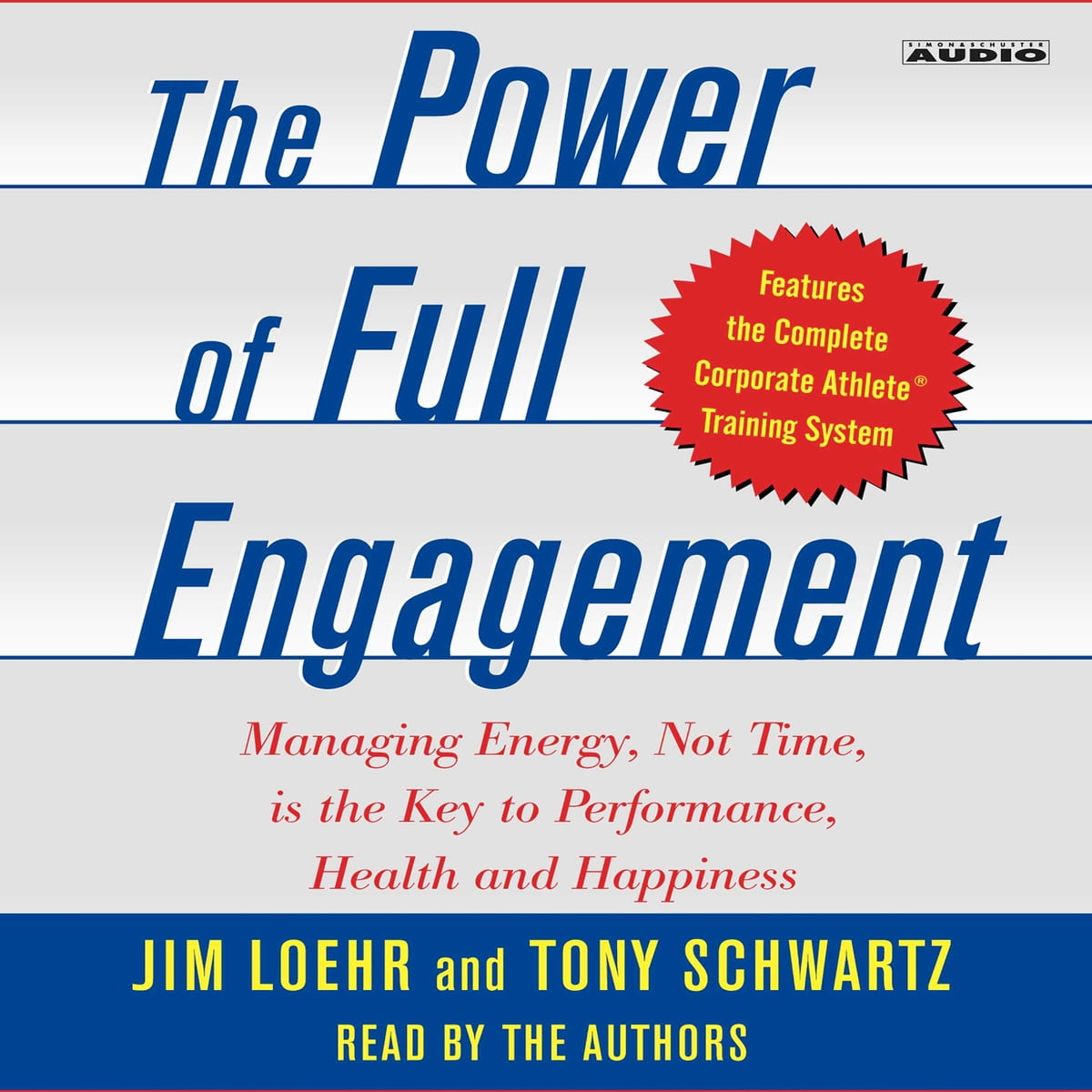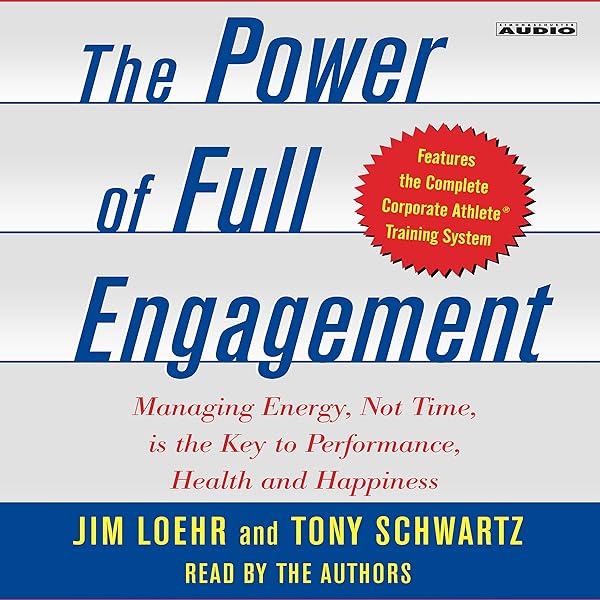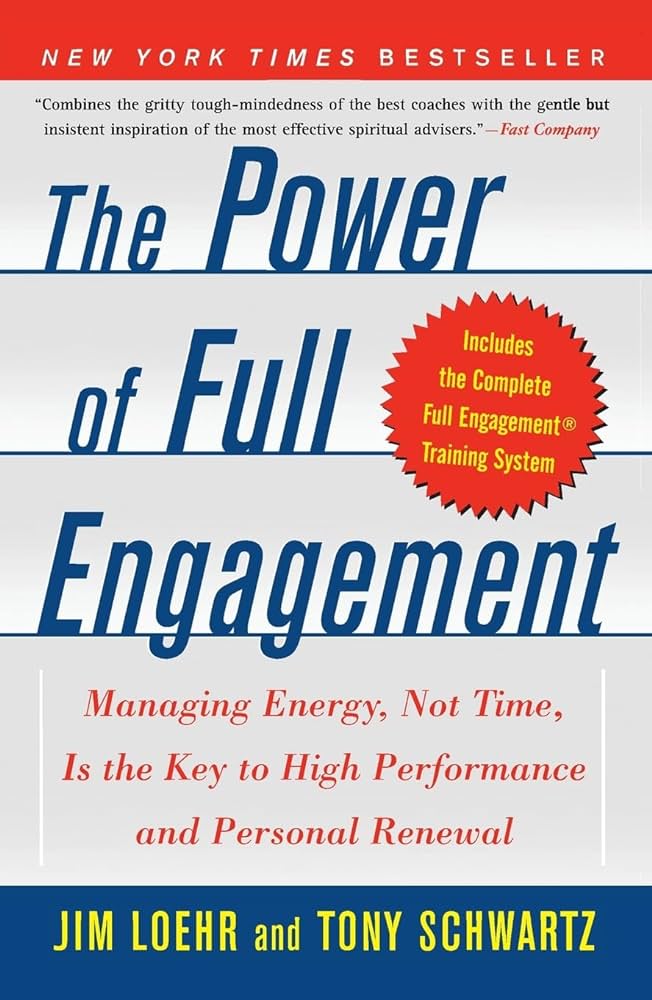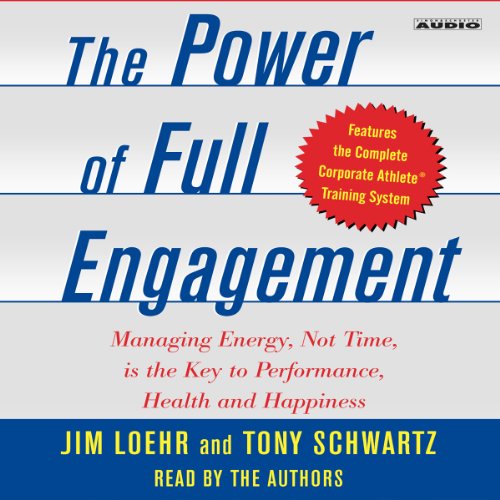“The Power of Full Engagement” by Jim Loehr explores how managing energy, not time, is the key to high performance. The audiobook teaches practical strategies to maximize energy for better productivity.
In “The Power of Full Engagement,” Jim Loehr and co-author Tony Schwartz discuss the importance of managing energy for peak performance. They argue that traditional time management techniques are insufficient. Instead, they emphasize the need to balance energy expenditure and renewal.
The book outlines four key energy sources: physical, emotional, mental, and spiritual. By addressing these areas, individuals can achieve sustained high performance and personal fulfillment. The audiobook provides actionable advice and real-life examples, making it a valuable resource for anyone looking to enhance productivity and well-being.

Introduction To ‘the Power Of Full Engagement’
Jim Loehr is a renowned performance psychologist. He co-founded the Human Performance Institute. Loehr has worked with top athletes and business leaders. His work helps people manage energy, not time. Loehr has written many best-selling books. His credentials make him an expert in performance psychology.
The book focuses on managing energy for success. It teaches how to balance energy across four areas: physical, emotional, mental, and spiritual. Loehr argues that energy, not time, is the key to high performance. The book provides practical strategies to boost energy. Readers learn to build rituals that sustain energy. This approach leads to better performance and satisfaction.
Energy Management Vs. Time Management
Jim Loehr’s “The Power of Full Engagement” audiobook emphasizes energy management over time management. It explores optimizing energy to maximize productivity and performance.
Shifting Paradigms
Many people focus on time management. Energy management is more important. Time is a limited resource. Energy can be renewed. Balancing energy levels helps in achieving goals. This approach leads to better performance. It helps in maintaining focus. High energy levels lead to better productivity.
Case Studies In Energy Management
A professional athlete practices energy management. He takes regular breaks. He maintains a balanced diet. This helps in sustaining high energy levels. A corporate executive uses similar techniques. She schedules breaks during work. This helps in maintaining focus and productivity. Both professionals achieve better results by managing energy effectively.
Four Key Energy Dimensions
Physical energy is about the body’s overall health. Exercise, sleep, and diet are key factors. Regular exercise boosts energy levels. Proper sleep helps the body recover. A balanced diet fuels the body efficiently.
Emotional energy impacts our feelings and mood. Positive emotions enhance energy. Negative emotions drain energy. Managing stress is crucial for emotional balance. Good relationships also boost emotional energy.
Mental energy focuses on our ability to concentrate and think clearly. Mental tasks require significant energy. Breaks and relaxation can refresh mental energy. Organizing tasks can improve mental clarity.
Spiritual energy is about purpose and values. Feeling connected to something bigger gives us strength. Aligning actions with values boosts energy. Meaningful activities enrich our lives.
Principles Of Full Engagement
Purposeful work keeps people motivated. It gives life meaning. Purpose helps in achieving goals. Goals make tasks feel less like chores. Enjoying what you do is important. It makes work more rewarding. Passion turns hard work into fun. Everyone should find their purpose. This leads to a happier life.
Positive energy rituals are essential. They help maintain focus and energy. Simple habits can make a big difference. Examples include exercise, meditation, and healthy eating. These rituals create a positive mindset. A good routine can improve productivity. Stick to healthy habits daily. They lead to a better life.
The Energy Audit
Start by looking at your daily routines. Observe your energy levels throughout the day. Notice when you feel most energetic and when you feel drained. Keep a journal to track your mood and energy. This helps in identifying patterns.
Find out where you lose the most energy. It might be during specific tasks or at certain times. Energy gaps can be physical, emotional, or mental. To identify them, pay attention to stressful moments. Look for tasks that make you feel tired.
Address these gaps by making small changes. For example, take breaks or change your routine. Consistency in small changes can lead to big improvements in energy.

Building Capacity
Endurance training is crucial for maintaining energy levels. Physical exercises like running and swimming help build stamina. Mental endurance is also important. Reading books and solving puzzles can improve this. Regular practice makes a big difference. Consistency is key. Small steps lead to big gains.
Recovery is as important as training. Sleep is vital for recovery. Aim for 7-8 hours each night. Nutrition plays a big role too. Eat balanced meals with protein, carbs, and fats. Hydration is another key factor. Drink enough water daily. Relaxation techniques like meditation and deep breathing help reduce stress.
The Power Of Positive Rituals
Positive rituals boost energy and focus. A good routine brings structure to your day. Start with a morning ritual. This can include stretching, meditation, or journaling. These actions set a positive tone. Evening rituals help you wind down. Reading a book or listening to calm music works well. Consistent routines create balance. They also reduce stress and increase productivity.
Successful people use rituals daily. Athletes often have pre-game routines. They stretch, focus, and visualize success. Authors have writing rituals. Some write every morning at the same time. Entrepreneurs start their day with exercise. This keeps their mind and body sharp. These examples show the power of rituals. They bring discipline and success.

Transforming Work And Life
Balancing work and life is essential. Jim Loehr’s audiobook provides tools for this. It teaches how to manage energy, not time. This approach leads to better results. People feel happier and more productive. They find time for family and hobbies. Life feels more fulfilling.
Making changes is hard. The audiobook offers strategies to keep changes going. It suggests starting with small steps. Build on these steps gradually. This method makes new habits stick. Consistency is key to long-term success. Strong habits lead to a better life.
Key Takeaways From The Audiobook
Energy management is more crucial than time management. Focus on energy levels to enhance performance. Full engagement requires balancing energy across different areas. Physical, emotional, mental, and spiritual energies are essential. Regular breaks and recovery are vital for sustained energy. Identifying personal purpose boosts motivation and engagement.
Create routines to manage energy effectively. Incorporate physical activity into daily life. Practice mindfulness and emotional regulation techniques. Set clear goals aligned with core values. Prioritize tasks that align with your purpose. Build a supportive environment for these practices.
Conclusion
Jim Loehr’s “The Power of Full Engagement” audiobook offers transformative insights. Embrace its strategies to boost productivity and well-being. This audiobook is a must-listen for anyone seeking to balance energy and focus. Experience a remarkable shift in your personal and professional life.
Engage fully and unlock your true potential today.



